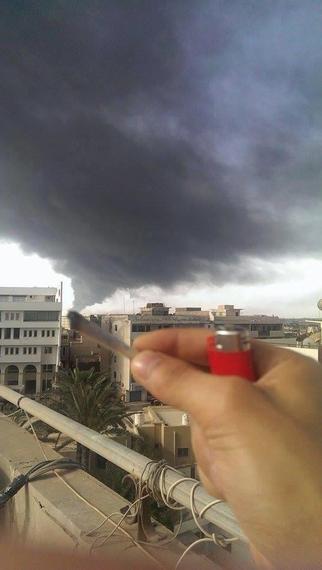By Ethan Chorin and Husni Bey If there was ever a J.R.R. Tolkien moment in the Libya conflict, it has arrived. The forces of good and evil, abstracted here to represent 'those who want progress', and 'those who would rather have nothing, if not their version progress', are fighting the future of Libya -- not in Mordor, but in concentric circles around Tripoli Airport and Benghazi. From the outside, the rapidly escalating violence looks to be the result of hopeless confusion and self-debasement. In fact, it is the direct outcome of some clarity, and some success. The West needs to get off the fence and help, before Libya's fragile new infrastructure is wiped completely clean.
In the year following the Western-assisted ouster of Col. Gaddafi in 2011 criminals and extremists hijacked the Revolution, pushing aside the moderate but disorganized majority. Ill-prepared and executed assistance programs cost valuable time, with a good fraction of 'modest millions' of dollars awarded organizations with little knowledge of Libya or its context. The attack on the U.S. compound in Benghazi in September 11, 2011 by design pushed the Americans, and then most foreigners out, leaving a city of close to one million at the mercy of a small but growing and determined number of spoilers.
Despite the ongoing violence and disarray, there have been muted but substantive gains. Libyans checked Muslim Brotherhood ambitions in parliamentary elections on June 25. Just a few weeks before, the sitting Prime Minister Abdullah Al Thinni challenged, in Libya's Supreme Court, the legality of the election of Ahmed Metig to succeed him -- and won. Metig was induced to step down. There have been wide protests against Libya's Grand Mufti for inciting 'gratuitous violence'. Collectively, and individually, these are remarkable acts of civil responsibility.
Over the last few months, in a kind of un-harmonic convergence, the spoilers have individually and collectively decided to drag the state under. Thus we've seen an increase in fighting in the West, with the powerful Misurata militia and its Islamist supporters fighting the Zintani militia and their allied brigades over the Tripoli airport. In the East, the renegade General Khalifa Hifter continues to add fuel to the fire with his desultory, destructive campaign against "Islamists", inducing the Egyptians to consider military action.
In a recent BBC interview former Libyan PM Ali Zeidan said he did not blame Islamists specifically for what is happening, but "all Libyans." But Libyans are not operating on a fair playing field, and never were. Unlike neighboring Egypt and Tunisia, the 'new Libya' has had to start from zero. It has been inundated with nearly a billion dollars in weapons, much of which entered after the lifting of Western arms embargoes while Gaddafi was still in power. The West's 'light footprint' intervention led to a situation where the naked patient was essentially left to hobble around in a snake pit. In a NYT interview on Friday President Obama rued that intervening in Libya 'without sufficient follow-up on the ground', was 'probably his biggest foreign policy regret'.
The solution is not a wholesale intervention, but a series of intensified, coordinated and targeted actions, necessarily led by the West and neighboring states, with gains secured by the U.N., which older Libyans credit for securing the country's independence in 1951. The program would build on more helpful operations, such as the foiling by U.S. SEALs of Eastern separatist attempts to sell oil out from under the central government.
Libya needs a proper, elite security contingent: a young, regionally and tribally heterogeneous force, loyal to the state. There is no apparent viable process for identifying suitable recruits or building an esprit de corps. Libyans need their national assets back: airports, refineries, ports, hospitals - and oil - all of which militias and non-state actors exploit to advance their own narrow objectives. Libya's direct neighbors have indicated willingness to accept more aggressive U.S. and E.U. technical assistance to police vast shared borders, and start to control criminal trade in weapons and drugs that are fueling conflicts across two continents. Above all, the city of Benghazi needs to be made safe again -- not only for its captured citizens, but Libya's new legislature, currently billeted to the far Eastern town of Tobruk.
Outside assistance should be at Libya's invitation, and ultimately, expense. The Libyan House of Representatives last week called for an 'immediate and unconditional cease-fire', and reserved the right to take 'all necessary steps', including requesting international support. It has just authorized U.N. intervention to protect civilians. With relative calm, Libya will heal, and hopefully become one of the West's most effective allies in the region, a stabilizing presence in the Middle East and Africa, not a destabilizing one.
Libya has suffered neglect under Gaddafi, and it has suffered neglect after Gaddafi. Gaddafi's narcissistic proclamations of 'après moi, le déluge,' were never to be taken seriously, but have become dangerously close to reality, due to errors committed on all sides. The West still has reliable local interlocutors, the same who warned the U.S. of 'imminent state collapse' and reluctantly helped coordinate the its departure last month. While it is obvious there is little appetite in the U.S. for corrective action, the alternatives are truly frightening. Husni Bey is Chairman of the HBGroup, and a Co-Founder of Libya First. Ethan Chorin is author of Exit the Colonel and Translating Libya.
Photo credit: S. Addahoumi
